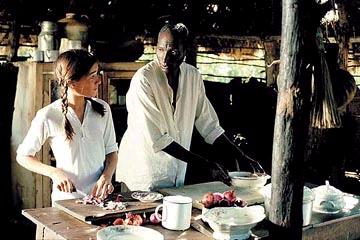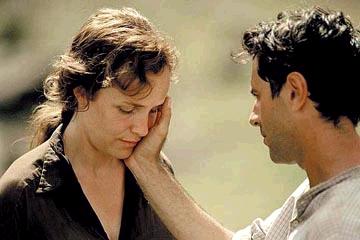Nowhere in Africa
(Nirgendwo in Afrika)


Nowhere in Africa comes with a prestigious pedigree. It won five awards at the German Academy Awards including ones for Best Film and Director. It takes place during World War II and is about Jews escaping Nazi Germany, is based on a true story, is in three languages, and has an epic scope. All this makes it a shoo-in for a nomination for Best Foreign Film for the Oscars. Especially since Nowhere in Africa is actually a good movie. Recent documentaries showed the extraordinary lengths that people took to escape the Nazis, be it to England or Shanghai, and if any place seems more exotic than the latter than it is surely Kenya. Told from the view of Regina Redlich (played by both Lea Kurka and Karoline Eckertz), Nowhere in Africa is really the story of their mother Jettel (Julian Kohler, Hood, Aimee and Jaguar).
Jettel's husband Walter (Merab Ninidze, Bride of the Wind, England!) moved to Kenya earlier, anticipating that life for Jews would become increasingly difficult under Hitler. When he saved enough money, he paid to have Jettel and Regina moved to Kenya and live with him, where he worked on a farm. Walter, being the pragmatic one, asked Jettel to bring a refriderator and other useful objects. Instead, she brought the China and bought an evening gown. This caused a rift in the marriage that lasts through the entire film. In Germany, the Redlichs lived a comfortable middle-to-upper class life, and now she was reduced to nothing. Jettel did not adjust easily. Initially, she treats the cook, Owuor (Sidede Onyulo, Eyes of a Witness) with much disdain, prompting Walter to comment that she treats him and other Kenyans much like the Nazis treat the Jews.
Director Caroline Link (Annaluise & Anton, Beyond Silence) works successfully on two levels. She shows how sweeping events happening in the world affect the lives of a small group of people, and how Jettel finds herself in an alien land and slowly becomes her own woman. Although Kenya is thousands of miles away from Europe, letters from family (or lack thereof) and a British presence in Africa continually remind the Redlichs that the War is never far. At the same time, Jettel needs to learn how to adapt to life in what is essentially a completely different world. Regina's presence makes things much easier. Like most children, Regina is naturally curious, and accepting. She instantly takes to Owuor, and over the years easily adapts to their new life. Link based Nowhere in Africa and Regina on Stefanie Zweig, who wrote a novel based on her own experiences.
With only herself to rely on, Jettel finds herself forced to change the way she does things and views the people around her. She finally feels a sense of belonging, and of home, stronger than when she was back in Germany. It comes to the point where she is strongly against leaving Kenya for Germany once the War ends. By this time, she is completely different than when she arrived, and Kohler gives an incredible performance. The passage of time also seems convincing given the uncanny resemblance between Kurka (young Regina) and Eckertz (teenage Regina). Link does spend some time with Walter, but it feels like he gets the short end of the stick. He also has a rich character, but there is not enough time to explore it. And the Owuor character sometimes feels like it borders on the stereotypical, but altogether these are small gripes for an otherwise compelling film.